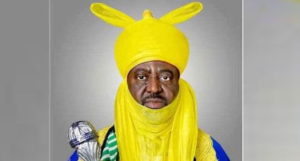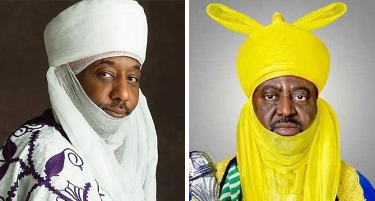In a dramatic and unprecedented turn of events, the Federal High Court and the Kano State High Court have issued conflicting interim injunctions concerning the Kano Emirate, escalating tensions and creating uncertainty in the state. This legal battle underscores the intricate relationship between traditional institutions and modern governance in Nigeria.
The Federal High Court in Kano, presided over by Justice S. A. Amobeda, issued a striking order for the eviction of Emir Muhammadu Sanusi II from the Kofar Kudu Palace. This decision effectively reinforces the authority of the 15th Emir of Kano, Aminu Ado Bayero. Justice Amobeda’s ruling includes an injunction restraining the respondents from inviting, arresting, detaining, threatening, intimidating, or harassing the applicant. “This order ensures that Emir Aminu Bayero enjoys all rights and privileges accrued to him by virtue of his position,” stated Justice Amobeda, underscoring the court’s support for Emir Bayero’s leadership.
Conversely, the Kano State High Court, under the jurisdiction of Hon. Justice Amina Adamu Aliyu, issued an injunction aimed at protecting Muhammadu Sunusi and other key figures from potential harassment by state authorities. This order explicitly prevents any interference with the Emir’s autonomy and the seizure of key symbols of his authority, such as the twin spear, the Royal Hat of Dabo, and the Ostrich-feathered shoes.
Justice Aliyu emphasized, “An order of interim injunction is granted restraining the respondents from harassing or intimidating the applicants or confiscating any symbols of the Emir’s authority.” She further directed, “The respondents are ordered to maintain the status quo pending the hearing and determination of the motion on notice.”
 These conflicting judicial orders have plunged the Kano Emirate into a state of significant confusion regarding the rightful authority and protection of the emirs. The State High Court’s case is set for further hearing on June 13, while the Federal High Court has adjourned its case to June 4. The judiciary’s involvement in this matter highlights the critical role it plays in upholding the rights of traditional institutions amidst the complexities of contemporary governance.
These conflicting judicial orders have plunged the Kano Emirate into a state of significant confusion regarding the rightful authority and protection of the emirs. The State High Court’s case is set for further hearing on June 13, while the Federal High Court has adjourned its case to June 4. The judiciary’s involvement in this matter highlights the critical role it plays in upholding the rights of traditional institutions amidst the complexities of contemporary governance.
Experts believe this legal tussle highlights the delicate balance between Nigeria’s historical and cultural legacies and its modern administrative frameworks. Legal analyst Nura Muhammad Adam noted, “These orders reflect the intricate and often contentious relationship between different layers of the judiciary and traditional authority structures in Nigeria.” Constitutional lawyer Salisu Umar emphasized the need for a fair judicial process, stating, “It’s imperative that the judiciary ensures a fair and just process to uphold the dignity and rights of all parties involved.”
As both courts prepare for their respective hearings, the people of Kano and observers across Nigeria are keenly watching the developments. The resolution of this legal conflict will significantly impact the leadership and governance of one of Nigeria’s most prominent traditional institutions. The outcome will not only determine the immediate future of the Kano Emirate but also set a precedent for how traditional and modern governance structures interact in Nigeria.
In the coming weeks, the judiciary’s decisions will be pivotal in either calming the waters or further complicating the traditional dynamics within the state. The legal resolutions will be closely scrutinized, as they will influence the future governance and leadership of the Kano Emirate, a cornerstone of Nigeria’s cultural heritage. The situation remains fluid, and the hope is for a resolution that respects both the traditional values and the rule of law, ensuring stability and continuity for the Emirate and its people.




